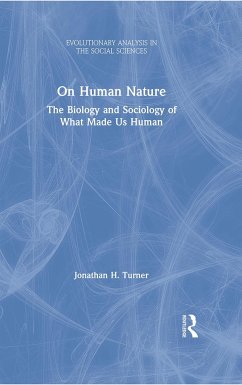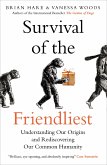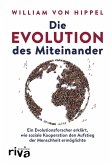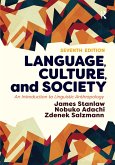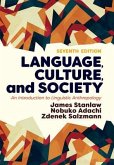Randall Collins, University of Pennsylvania
"This remarkable book is both unusually comprehensive and at the same time highly readable. After a slow start, sociology is now being integrated with the findings of evolutionary biology, with Jonathan Turner in the lead. This treatment of human nature and its evolution is powerfully eclectic, using theories and data ranging from primate ethology to theories of emotion to brain science, and includes some pleasant surprises in the form of American Pragmatism and the work of Mead and Cooley. A provocative synthesis."
Christopher Boehm, Professor of Biological Sciences, University of Southern California
"Jonathan Turner can be counted among the few in American sociology who ask huge questions, master sprawling literatures, and defy the imperialism of radical social constructivism. He takes nature seriously and wants to know what nature means for humanity. This book continues and extends Turner's decades-long project of systematically understanding and explaining foundational concerns about humanity-that is, us, we ourselves. Not everyone will agree with his story, but I commend it as important and fascinating nonetheless. At a time when the authority of science itself is increasingly publicly questioned, Turner admirably models a long-view scholar taking genuinely interdisciplinary science seriously."
Christian Smith, William R. Kenan, Jr. Professor of Sociology, University of Notre Dame
"This book by the internationally well-known sociologist, Jonathan Turner, is the one that I personally have been waiting for. Turner is a path-breaking intellectual in evolutionary sociology, neurosociology, and the sociology of emotions. On Human Nature is the ultimate summary of his brilliant theory of what made us human. His vision is truly breathtaking!"
Armin W. Geertz, Professor Emeritus, Aarhus University
"Jonathan Turner is one of few social theorists who cross disciplinary boundaries in a serious way, engaging biology, anthropology, evolution, genetics, brain science, psychology, and sociology. Rejecting the tautological logic of the 'just-so stories,' so often associated with evolutionary work, Turner reveals the labyrinth-like complexity of human nature. Turner is a sure-footed guide through these labyrinths, rendering his insights useful for thinking about a wide variety of social phenomena. Ultimately, Turner's Human Nature is a cutting-edge work that should matter to all social scientists."
Erika Effler-Summers, University of Notre Dame

